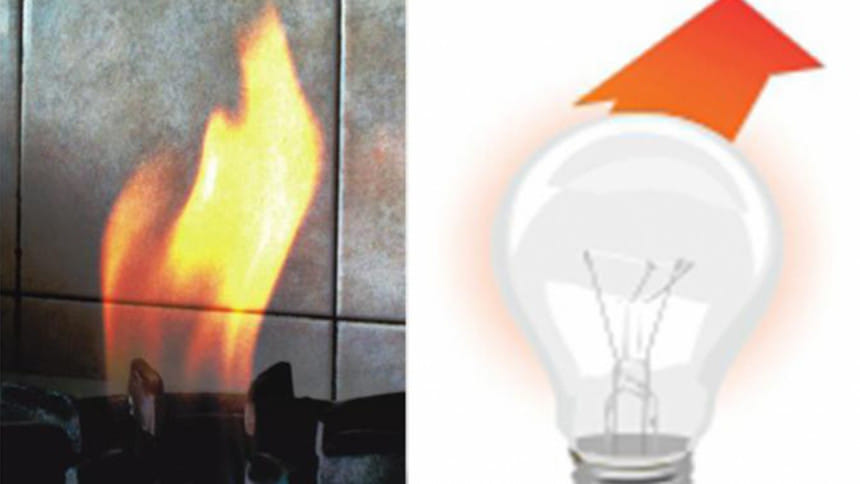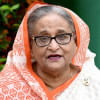Govt wrests control of energy pricing


Electricity and gas prices can now be adjusted without a public hearing after the cabinet yesterday amended a law, paving the way for introducing dynamic energy pricing in Bangladesh.
The development comes following a proposal to amend the Bangladesh Energy Regulatory Commission (BERC) Act 2003 to include a provision that would allow the government to adjust the prices of gas, electricity and fuel in special circumstances.
For adjusting gas and electricity prices, BERC until now held public hearings and announced its decision 90 days later.
"We are going through a special circumstance now," Nasrul Hamid, the state minister for power, energy and mineral resources, told The Daily Star yesterday.
Because of the Ukraine war, there is volatility in energy prices in the global market and it is difficult to predict in which direction the prices would move, he said.
If the prices scale higher, the government's subsidy burden would become excessive. So the domestic tariff would need to be adjusted as and when the price swings take place in the international market.
BERC's process for price adjustment takes a while; and by the time the adjustment is made, a newer price can take effect in the international market.
"We sent a proposal two years ago for an electricity tariff hike and it took BERC one-and-a-half years to adjust it. After one-and-a-half years that tariff is not relevant anymore. Keeping these issues and emergency situations in mind, we took this step."
In the near future, the domestic energy prices will move in the same direction as the global prices like in other countries, Hamid said, citing the pricing of liquefied petroleum gas as a case in point.
The government is now working on a dynamic pricing formula, which is followed by most countries. In the system, local prices are synced with international ones, reflecting the fluctuations in the global market.
The pricing system, which was introduced in neighbouring India in 2017 with great success, has long been a demand of economists and multilateral lenders due to the inefficiency of the existing subsidy-reliant administered pricing mechanism.
Other than distorting the prices, the artificially low price at the cost of taxpayers' money benefits the rich and poor alike, and it is largely the well-off who are major consumers of energy. That money could instead be used in the health and education sectors and for making the social safety net schemes meaningful.
Keeping populism in mind, the government has so far resisted a shift away from administered pricing and continued to bear progressively larger subsidy bills. A record Tk 82,745 crore has been earmarked for subsidy in this fiscal year's budget, up 53.7 percent from the previous year's original budget.
"We have looked at the pricing formula in other countries," Hamid said, adding that the automated pricing mechanism would be applied to gas, electricity and fuel prices.
Asked if the move is part of prior actions for the prospective $4.5 billion loan package from the International Monetary Fund, he said: "No, we were considering it from before."
The amendment to the BERC Act 2003, which was approved in the cabinet meeting chaired by Prime Minister Sheikh Hasina, would also enable the government to set an effective tariff for both the industries and the general public.
"We have to think sector-wise. We have to provide uninterrupted gas supply to industries and also provide electricity to people at competitive rates -- we have to strike a balance and also come out of subsidies."
Gas supply to industries is being rationed after the government halted the spot purchase of liquefied natural gas following a steep rise in price in the global market and strain on foreign currency reserves. This has hit industrial output.
"The factory owners have said they are willing to pay the international price, so we are allowing the private sector to import both fuel and LNG. Alongside BPC [the Bangladesh Petroleum Corporation], the private sector will distribute fuel," Hamid added.
The move would avert the industrial energy crisis from escalating and derailing Bangladesh's growth momentum.
The summary provided to the cabinet from the energy division said the amendment to the BERC Act 2003 -- last done in 2020 -- is necessary "for the sake of the economic growth in progress".
Adjusting the electricity and gas prices by following all the procedures mentioned in the laws and regulations is a complex and lengthy process, said the summary signed by Md Mahbub Hossain, senior secretary to the energy division, on November 14.
In the current global context, to ensure an uninterrupted electricity and energy supply, the prices of electricity, gas and petroleum products need to be adjusted "fast and on a regular basis" in line with the international market.
Subsequently, the draft of the ordinance made an addition to Clause 34 (3) of the BERC act that authorises only the commission to determine tariffs: "but with condition that the government could fix the tariff by publishing government gazette until the commission wouldn't form the regulations".
And another sub-clause will be added to ensure the government's authority to fix the energy prices by the government itself, according to the summary.
"An implementing agency will now be able to fix the prices of power and energy -- it is a brutal attack on the basic principle of the law," said M Shamsul Alam, a prominent energy expert.
The BERC Act 2003 was formed to ensure the protection of consumers and create a competitive market. The process of building a permanent structure of a regulatory body started after the law was formed in 2003.
"And with the new decision of having an ordinance, there will be no existence of such a structure. Now, there will be a monopoly in business. As a consequence, consumers will not get any protection," said Alam, also the vice-president of the Consumers Association of Bangladesh.
At present, BERC follows a quasi-judicial process to adjust gas and electricity prices, said Ghulam Rahman, the president of CAB.
"People can express their opinions -- this opportunity will now be lost," he added.
Khandker Anwarul Islam, cabinet secretary, however, said BERC will continue to adjust prices as before but under special circumstances, the government would intervene.
"Sometimes, immediate need for price adjustment emerges -- say, if a price drops significantly in the world market. BERC's process cannot address the need in good time. By necessity, the government would fix the energy tariff then."
Asked what construes as special circumstances, Islam said: "The current situation is a special circumstance… taking the situation into consideration the government could adjust the price within a day or two."
Since there is no parliament session, the ordinance has been brought before the cabinet for quick implementation, said an additional secretary of the cabinet division on the condition of anonymity.
It will be in effect through a gazette notification, he said, adding that the notification will be issued soon.
"This does not appear to be a step in the right direction," said Zahid Hussain, a former lead economist of the World Bank's Dhaka office.
The argument that it takes too long for BERC to make price changes in line with changes in import prices also applies to petroleum pricing, which BERC does not regulate, he said.
But fuel prices remain sticky downwards.
"There is, therefore, no guarantee that allowing the energy ministry to set prices through gazette notification will enable more timely response of domestic prices to changes in import prices."
The scenario would be different if an automated pricing mechanism is adopted.
"This will eliminate the exercise of arbitrary bureaucratic discretion in energy pricing and make factors contributing to changes in domestic prices of energy more transparent," he added.
The government took full control of energy pricing and it could be on the IMF's recommendation, said Ahsan H Mansur, executive director of the Policy Research Institute.
The ordinance will first be applied in the case of electricity tariff.
From next month, the electricity price at the producers' end would be 19.92 percent more, and the six state-owned distributors have applied to BERC to hike prices at the consumers' end.
Now, this will most likely come into effect sooner than allowed under BERC's jurisdiction.
Meanwhile, the cabinet also discussed allowing private companies to import fuel and LNG, Islam told the press briefing.
The government is mulling whether it will be better to allow private companies to import refined oil and sell it to the market directly or crude oil.
After refining the crude oil, they could either sell the oil to BPC or market directly.
The government will have to bring amendments to the respective act to allow them to sell the refined oil to the market directly and they will also have to get clearance from the Bangladesh Standards and Testing Institution.
"However, no concrete decision has been taken yet," Islam said.


 For all latest news, follow The Daily Star's Google News channel.
For all latest news, follow The Daily Star's Google News channel. 







Comments